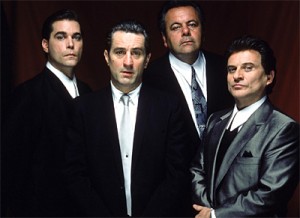The Maple Syrup Gang sounds like something out of Little Rascals and the He Man Woman Haters Club.
 In Dec. 2012, 18 people were arrested in Quebec after pulling off a massive maple syrup heist.
In Dec. 2012, 18 people were arrested in Quebec after pulling off a massive maple syrup heist.
The sweet stuff was stolen in the town of Saint-Louis-de-Blandford between August 2011 and July 2012.
About 2.7 million kilograms of maple syrup, worth up to $18 million, was reported missing after a routine inventory check last summer.
Last week, Graeme Hamilton of the National Post reported a jury decided three of the men involved were common criminals.
After two days of deliberations at the courthouse in Trois-Rivières, Que., the 12-member jury delivered guilty verdicts against one of the ringleaders and two of his accomplices in the first case to come to trial following the brazen syrup theft.
Richard Vallières, 38, was found guilty of theft, fraud and traffic of stolen syrup. Étienne St-Pierre, 73, was convicted of fraud and trafficking, and Raymond Vallières, Richard’s 62-year-old father, was convicted of possession of stolen syrup. A fourth accused, Jean Lord, was acquitted on a possession charge.
The trial heard that over a 12-month period in 2011 and 2012, nearly 3,000 tonnes of syrup disappeared from a warehouse used by the Federation of Quebec Maple Syrup Producers. In dollar terms, it was “the largest theft investigated by the Sûreté du Québec in its history,” Crown prosecutor Julien Beauchamp-Laliberté said.
The theft and fraud were committed against the provincial federation, which acts as a marketing board. The stolen syrup was pumped into a black market that undermines the quotas and prices established by the federation, the prosecutor said.
During the fall of 2011, a tractor-trailer began appearing at a federation warehouse in Saint-Louis-de-Blandford, Que. and loading up barrels filled with syrup from that spring’s harvest. The barrels were transported to a sugar shack belonging to Raymond Vallières, where they were emptied and replaced with stream water. When the stream froze over, the syrup-transfer operation moved to a warehouse in Montreal in early 2012. Finally, the prosecutor said, the thieves drained the barrels directly at the federation warehouse. In total, 9,571 barrels were surreptitiously emptied, representing more than half the stockpile the federation keeps to maintain a stable price.
 It wasn’t until August 2012 that federation staff grew suspicious when they noticed some barrels were dirty and rusty; when the containers were tapped, some sounded emptier than others.
It wasn’t until August 2012 that federation staff grew suspicious when they noticed some barrels were dirty and rusty; when the containers were tapped, some sounded emptier than others.
The theft made international headlines, but the trial heard the valuable stockpile was protected with minimal security. The warehouse “wasn’t fortified. There were no security cameras or guards,” one of the co-owners testified.
The crime occurred amid a long-running dispute between the federation and rogue syrup producers and buyers who don’t want to be constrained by the quota system. Sébastien Jutras, a trucker who served eight months in prison after pleading guilty to his involvement in the plot, testified that after one syrup delivery, Raymond Vallières offered his opinion of the federation and the syrup being drained from its reserves: “Stealing from thieves is not stealing,” he said.
In a 2014 police interview played for the jurors, Richard Vallières said he had been buying and selling on Quebec’s maple syrup black market for 10 years and had previous run-ins with the federation. “They were after me because I buy a lot. . . . They want more control over the syrup,” he said.
The trial heard that as much as $200,000 in cash changed hands for a single syrup transaction, and the players used burner phones to avoid detection.
Richard Vallières’ defence was that he committed the theft under duress. He testified that when he realized the syrup he was buying came from the federation warehouse, he tried to back out. But the seller, who cannot be identified because he faces a jury trial in January, threatened him at gunpoint. Vallières said his wife and young daughter were also threatened.
But other evidence suggested Vallières was not too troubled by the theft. The jury heard of friendly text messages between him and the supposedly menacing seller. When the theft was uncovered and splashed across the news, Vallières’ response was, “The party’s over,” the jury heard.
A sentencing hearing has been scheduled for Jan. 27.






 Chinese food companies in particular have been blamed for making deadly alterations to dairy, baby and pet foods by adding melamine. The chemical makes it appear that the food or beverage has the required level of protein.
Chinese food companies in particular have been blamed for making deadly alterations to dairy, baby and pet foods by adding melamine. The chemical makes it appear that the food or beverage has the required level of protein.